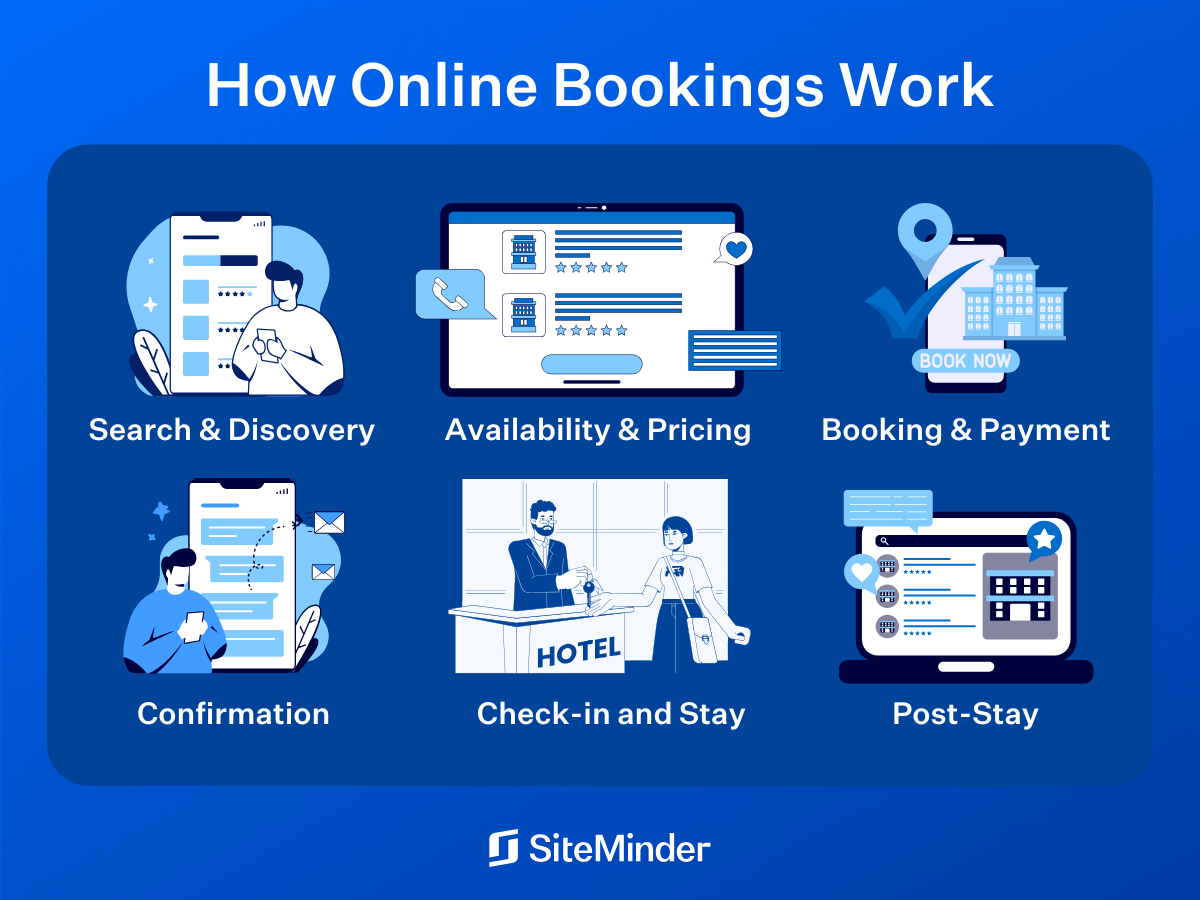What are online bookings in the hotel industry?
Online bookings in the hotel industry are digital reservation systems that allow guests to book accommodations directly through hotel websites, mobile apps, or third-party platforms like Booking.com and Expedia. With 80% of travelers saying it’s important to be able to book their trip entirely online, these systems have become essential for hotel revenue management and guest acquisition.
These bookings integrate with property management systems (PMS) and channel managers to provide real-time availability, dynamic pricing, and automated confirmation processes.
Online bookings not only streamline the reservation process but also enable hotels to reduce commission fees from OTAs by driving direct bookings through their own channels, with hotel websites generating an average of $519 per booking compared to just $320 through OTAs.
This blog will tell you everything you need to know about online bookings and how to take advantage of them.
Table of contents
Why are online hotel bookings important?
Online booking systems allow guests to reserve rooms immediately after finding your hotel or accommodation during their search. They generate revenue around the clock whenever a guest is ready to commit, widen your market beyond walk-ins, and free staff from constant phone and email enquiries.
Demand is vast. The American Hotel & Lodging Association estimates about 500 hotel rooms are booked online every minute in the United States, and the UN World Tourism Organisation recorded roughly 900 million international arrivals in 2024, most secured digitally.
When pandemic restrictions were lifted, travellers flocked to booking engines, OTAs, and hotel websites, rewarding properties that offered a quick, trustworthy path to purchase.
Easy access to live rates, reviews, and maps has shifted control to guests. They expect self-service and will move on if a site stalls, so a streamlined booking process is essential for converting interest into reservations.
How do online bookings work for hotels?
Online bookings for hotels is a diverse process with many different customer journeys.
However, there are generally two main routes:
- Direct online booking: This is when a guest books through a hotel’s individual website, typically through a dedicated online booking engine. Hotels can also funnel direct traffic via metasearch services or social media pages. This captures all of the guest information, integrates it with the hotel’s property management system, and blocks out that room for the booked period in the hotel’s scheduling.
- OTA booking: This is when a guest books through an online travel agent, such as Expedia or Booking.com. In these cases, the guest books through the OTA’s booking process, typically through the OTA website. Hotels must be listed on the given OTA to appear as an option for that guest. Once booked, the OTA takes a commission from the sale, and then transfers the booking details to the reserved hotel. From there, depending on integrations, a hotel’s property management system will then translate that information into the hotel’s calendar, schedule, and listing availability.
This is a broad overview of how online bookings work for hotels and there will be unique situations and processes. Generally speaking, however, online bookings will either be direct or through an OTA.
Make online bookings effortless with the best technology
With a feature like Channels Plus, SiteMinder makes it easy for you to connect more online channels all in one place.
Learn more

How have online hotel bookings changed over time?
Online hotel bookings have shifted from agency-led phone reservations to a self-service landscape where travellers compare, choose, and confirm rooms on their phones in minutes. The growth of OTAs, mobile browsing, and peer reviews has given guests control, leaving traditional agents to serve only niche or infrequent trip-takers. For hotels, revenue now relies on always-on digital channels that reward clear content, instant confirmation, and smart distribution.
The consumer economy is now a user economy
Travel knowledge and information used to lie in bricks and mortar, dominated by brands and agencies, renowned for delivering an expertise that could be rarely challenged.
But the Internet has caused a tipping point to occur, enabling hotels to sell themselves to potential guests who appear to know precisely what they want, and the research they need to carry out in order to make their travel aspirations a reality.
Everything from photos through to guest reviews are creating information overload, as user generated content becomes a critical variable in the consumer’s battle for power. In the early days, travel agents and experts influenced consumers with experience and brochures illustrating what was available.
Later OTAs, and especially Booking.com, revolutionised this idea of putting the traveller in control by providing more content and information available at their fingertips.
Now we see the user economy taking control with the growth and development of Airbnb, Uber, Flip.to, and many others enabling self-selection. Travellers can have an authentic experience of living like a local, in the neighbourhood, visiting their host’s local favourites – and quite often at a fraction of the price. Travellers are willing to transact beyond hotel rooms, and as a result guests are becoming more efficient at making their final booking decisions.
The new doesn’t always replace the old
While online booking dominates among travellers, that doesn’t mean that traditional travel agent driven bookings have disappeared entirely. Many guests still use physical, brick-and-mortar travel agencies. Research has shown that about 30% book their trips via travel agents or tour operators – about the same as book direct.
However, digging deeper into the data, there is an important addendum to make. Nearly half of self-proclaimed regular travellers preferred using OTAs, followed by direct booking, leaving only 20% for travel agencies. The opposite was true for those who hardly ever travel: half of respondents in this category primarily use travel agencies, with a rough even split for the remainder between OTAs and direct booking.
The bottom line? Online booking is increasingly popular, particularly among those valuable frequent flyer guests. Hoteliers who haven’t yet mastered their online presence should do so to maximise their revenue. For hoteliers, it’s a question of managing and adapting to these changes. It’s evolution, not revolution.
Next steps:
- Traveller-led booking dominates, so keep your website and OTA listings fast, transparent, and mobile-friendly.
- Peer reviews and live comparisons drive decisions, making up-to-date visuals and clear pricing essential for conversion.
- Brick-and-mortar agents still serve occasional holidaymakers, but high-value frequent travellers book online, so balance direct, OTA, and agency channels to capture every segment.
How can hotels maximise their online booking potential?
What you need to know:
- With 97% of travellers reading reviews before booking, standout experiences along with visible feedback convert lookers into guests.
- Google’s Alpharooms case study proves that a lightning-fast, mobile-first checkout can double overall conversions and quadruple bookings on phones.
- Hotels that list on five or more extra channels through a channel manager gain up to 40% more bookings.
Hoteliers must think global and act local in order to capitalise on the guest’s winding path to purchase. We live in a multiscreen world, with many points of conversion, and it’s important to remember that rate is not the prime decision tool.
Yes, price is a big differentiator when assessing the challenge presented by the likes of Airbnb, but there are many more factors to consider. Hoteliers can take on the challenge in many ways.
1. Offer unique guest experiences
One example is to become more service-orientated, focusing on the elements of a hotel that home-sharing can’t offer – such as tour guides, chauffeured drivers, dry cleaning, restaurants, gyms and a bounty of amenities and loyalty points.
By offering an extraordinary guest experience, hoteliers can really capitalise on the impact of user generated content – reviews, social media check-ins, comments, ratings – and in turn use these positive affirmations to drive bookings.
2. Know where your bookings are coming from
A hotel’s biggest weapon in the fight for bookings is knowing the business mix inside out. Ask where your bookings are coming from. Ask what your local competition is doing to fill their rooms. Ask how you are driving your online and offline business. It is truly all about the details.
3. Use a channel manager
Hoteliers need to find balance and control of how your rooms are being distributed. Take charge of your bookings mix and ultimately your business.
Cloud technology, such as SiteMinder’s hotel channel manager, is levelling the playing field for independent hotels, helping them compete in a fast-changing market. It gives hotels of any size the power to be exactly where prospective travellers are – without the need to invest heavily in IT and systems providing more time for creativity and caring for your guests.
The multichannel, multiscreen world is now completely accessible, giving hoteliers greater opportunity to reach, attract, and convert global guests. Chain hotels have been doing this for years, reaping the benefits of having a visible online presence to ensure they turn lookers into bookers. It’s time for independents to take charge, challenge the status quo, and compete in the same way.
4. User-friendly booking process
In today’s digital landscape, a seamless and intuitive booking process is non-negotiable. A complicated or clunky interface can deter potential guests and lead to abandoned carts. SiteMinder’s user-friendly hotel booking engine is designed to simplify this process, guiding guests through each step with ease.
From room selection to payment confirmation, every touchpoint is optimised for convenience and speed. By reducing friction in the booking process, you not only enhance the guest experience but also increase the likelihood of converting browsers into confirmed guests.
5. Showcase riveting reviews
Reviews are the new currency of the digital age. They offer social proof and can significantly influence booking decisions. SiteMinder enables you to effortlessly showcase guest reviews and ratings directly on your booking platform. By integrating these testimonials, you’re not just displaying stars; you’re telling a story of satisfied guests and memorable stays. These authentic reviews serve as powerful endorsements, instilling confidence in prospective guests and tipping the scales in your favour when it comes to making a booking decision.


